Support strong Canadian climate journalism for 2025
There’s some very good news about Canada’s progress in meeting its climate targets.
A decade ago, Canada pledged a climate target for 2020 as part of the global Copenhagen Accord. That's coming due next year.
So how are we doing?
To illustrate, I've dug into Canada's latest emissions inventory and created a series of charts below.
The target
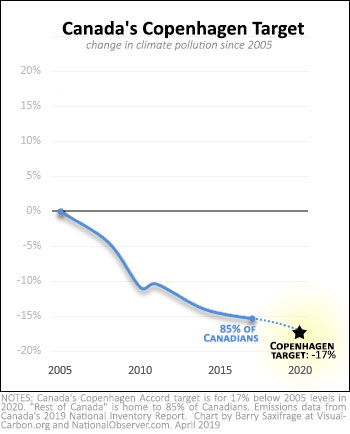
My first chart shows how close most of Canada has come to our target.
See the star highlighted in yellow? That's Canada's Copenhagen Accord target, set by the Harper government. It calls for a 17 per cent cut in climate pollution below 2005 levels.
The blue line shows that the combined emissions from all but two provinces are on pace to match the target. The provinces and territories in this blue line group are home to 85 per cent of Canadians.
The solid blue line marks the historical emissions reported so far. The dotted blue line shows government projections for 2020, based on current and proposed policies.
This on-target group includes Ontario, Quebec, British Columbia, Manitoba, Nova Scotia, New Brunswick, Newfoundland and Labrador, Prince Edward Island, Northwest Territories, Yukon and Nunavut.
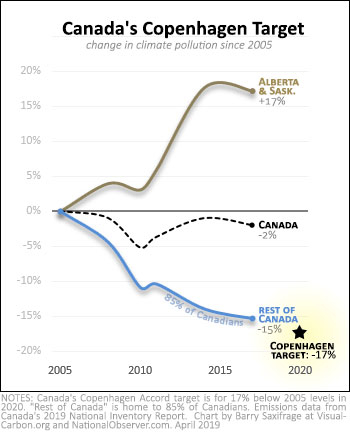
Unfortunately, the good news story turns sour when we include the two remaining provinces — Alberta and Saskatchewan.
Those provinces increased their pollution by 17 per cent.
As the next chart shows, this has erased nearly all the climate progress made by the rest of Canada.
The dashed black line shows Canada's overall result -- just a two per cent reduction. At the rate we are going we will arrive at our Copenhagen Accord target a century too late.
Sadly, as a country overall, we aren't anywhere close to doing what needs to be done.
The breakdown
My next chart let's you see what happened at the provincial level.
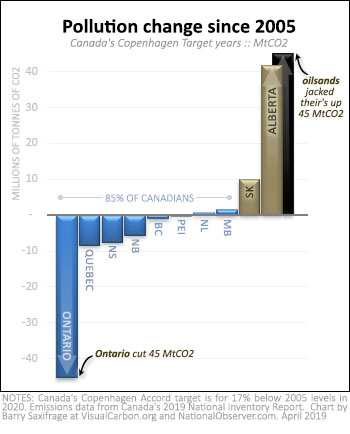
Each province has its own bar showing how many megatonnes of emissions (MtCO2) they've added or cut.
Two things jump out.
First, Ontario has led the way by cutting 45 MtCO2. Two-thirds came from eliminating coal burning from electricity generation.
The second big story is Alberta increasing pollution by 42 MtCO2. Alberta effectively erased the climate progress made by Ontario. And the towering black bar reveals the culprit — surging pollution from the oilsands industry.
The Canadian shuffle of "one step forward, one step back" was also repeated on a smaller scale. Saskatchewan increased its pollution by 10 MtCO2, erasing the climate progress made by Quebec and B.C..
One step forward, one step back. That’s why we’re not reducing climate pollution as a country.
The two halves
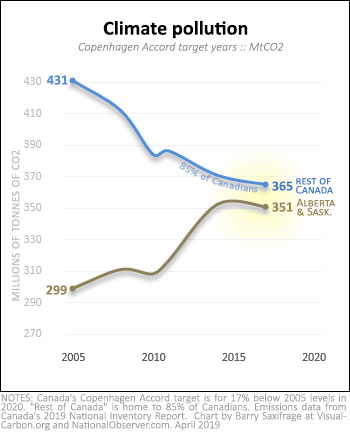
As a result of these opposing trends, Alberta and Saskatchewan now emit half the country’s climate pollution.
My third chart tells the tale.
Back in 2005, these two provinces emitted much less than the rest of Canada — 132 million tonnes less to be exact.
However, over the last twelve years Alberta and Saskatchewan increased their climate pollution by 52 million tonnes, while the rest of Canada cut back by slightly more.
Canada now finds itself fighting for a safe climate while the source of half of its emissions refuses to make any meaningful cuts in climate pollution.
Canada's impossible climate math
Alberta and Saskatchewan's ever-rising share of Canada's climate pollution is a long-term trend that is making it increasingly impossible for Canada to meet its climate obligations.
My final chart shows this clearly.
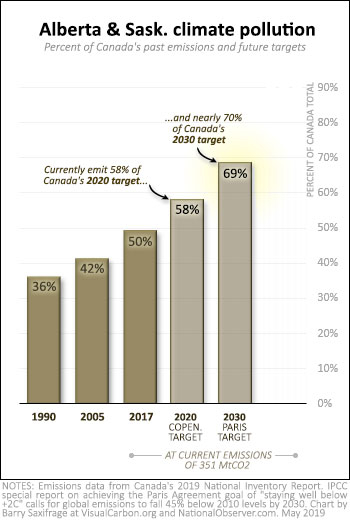
The three bars on the left show Alberta and Saskatchewan's share of Canada's recent emissions. Back in 1990, those two provinces emitted a little over a third of the country’s climate pollution. By 2005, their pollution rose to 42 per cent. And now it’s half of Canada's total.
Pollution from these two provinces has been allowed to grow so large that it now overwhelms Canada's future climate targets.
The two faded bars on the right show how much of Canada's future targets would be required just for Alberta and Saskatchewan's current emissions.
As you can see, their current emissions require 58 per cent of next year's Copenhagen Accord target. We've seen above how this has driven national climate failure in meeting Canada's target.
The next bar shows that their current pollution requires nearly 70 per cent of Canada's Paris Agreement target in 2030. But their governments aren't planning to stay at current levels — under current policies their emissions are projected to keep rising. So, Alberta and Saskatchewan will require even more of the national pie.
You don't need to be a math whiz to figure out that when 15 per cent of your population demands 70 per cent of your carbon budget, it is game over for reaching targets.
A growing climate emergency and deeper cuts
Unfortunately for Canadians, the climate crisis not a game. And because we've been dragging our feet for decades, the hard work to prevent the worst impacts from unfolding is only just beginning.
Climate damages are now starting to pile up. The world's safe carbon budget is nearly spent. And the younger generations are looking aghast at the damaged world the older generations are cooking up for them — and have started fighting in earnest to save themselves.
Driving all of this is the increasingly clear science that much deeper climate pollution cuts are needed by 2030 to prevent a full-blown climate crisis. According to the most recent report from the International Panel on Climate Change (IPCC), the world now needs to cut emissions an average of 45 per cent by 2030.
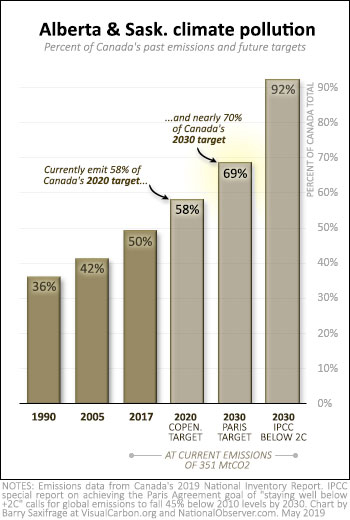
In response, a rapidly growing list of major cities and nations are declaring "climate emergencies" and increasing their ambition to match the science.
If you are wondering what it would it look like for Canada match the average cuts needed for a safe-and-sane climate, take a look at the last bar I've added to the chart.
It shows a scenario in which Canada adopts the IPCC global target for 2030 of 45 per cent below our 2010 levels.
As you can see, just at current pollution levels, Alberta and Saskatchewan already require 92 per cent of that 2030 target.
Clearly, the huge amount of climate pollution coming out of Alberta and Saskatchewan must start falling significantly if Canada ever wants to do its part in the climate fight.
'We are begging you to take immediate action'
Unfortunately, the latest projections — which include all current and proposed climate policies in Canada — show Alberta and Saskatchewan still polluting far above their 2005 levels in 2030. Worse, both provinces are now in court fighting to exempt themselves from even these undersized pollution-reduction policies.
Meanwhile, the urgency to act continues to build. This month a group of student climate strikers from Canada and the other G7 nations published a letter:
"We, the climate generation, demand the G7 set an example… There is no time left for endless discussions anymore. The clock is ticking, the water is rising, and the people are dying … You must have bolder emission reduction targets than the IPCC global average: 45% by 2030, net zero by 2050 … We are begging you to take immediate action, so that children everywhere in the world can have a future."
What's your answer, Alberta and Saskatchewan?
Editor's Note: This is the third article in Barry Saxifrage's ongoing series exploring Canada's latest emissions report. The first article looked at Canada's one-year jump in emissions and the path to our 2030 Paris target. The second article compared Canada to the U.K. for some eye-opening lessons in the climate fight. The next article will dig into the one clear climate success across Canada — cleaning up our electricity. Stay tuned.

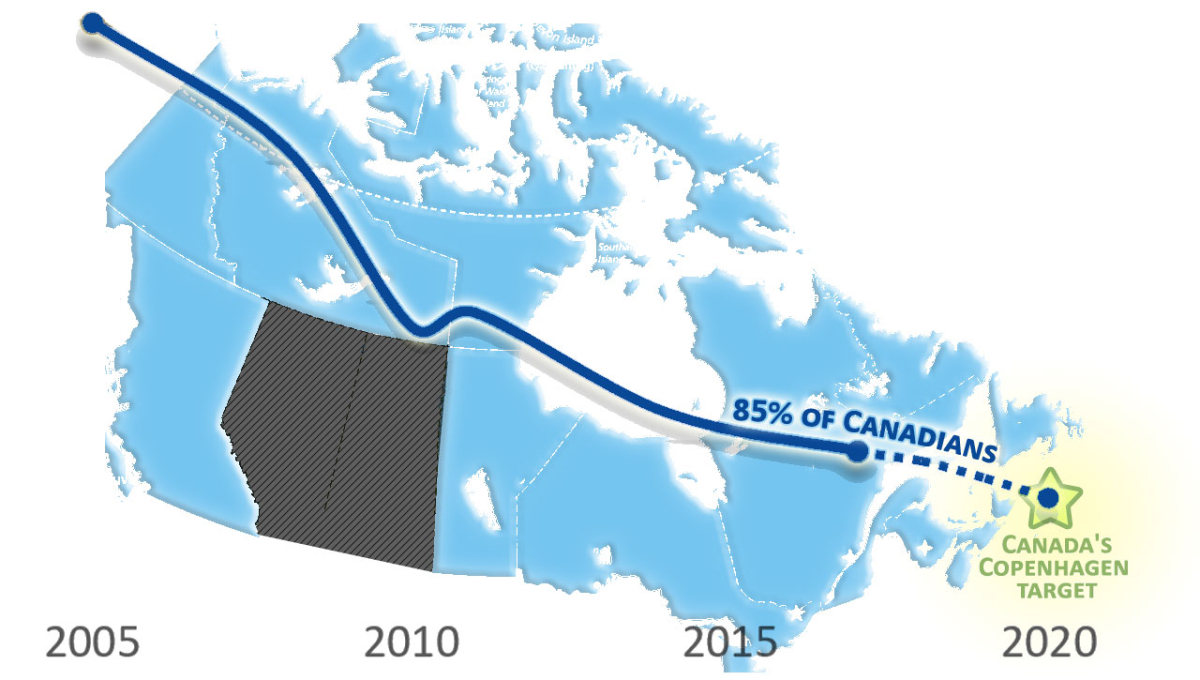



Comments
So the "national interest" according to fossil fools Kenney, Moe and Trudeau (in his bizarre Trans Mountain Pipeline supporting role), is to have Alberta and Saskatchewan take full "credit" for Canada becoming an international pariah in the existential efforts to combat climate change. Thank you again Barry Saxifrage for so articulately pointing out the utter fallacy of growing our fossil fuel economy to help fund the transition away from it.
My review of stats Canada data for 2018 show that Ontario accounted for 37% and Quebec 19% of all petroleum products purchased in Canada. I guess if you purchase your petroleum from US or Saudi it does not produce emissions?
If these two provinces account for 56% of petroleum purchased in Canada. I would like to see your data on emissions.
So where do you get the red dye for your herrings?
By the way, I drive a Leaf.
Greenhouse gas emissions account for all emissions produced by all the different sectors of the economy. Emissions from the transportation sector or emissions from burning natural gas that heats your house are amalgamated with other types of emissions, and doesn't take into account the origin of the fossil fuel used. Canada imports crude oil from other countries like Saudi Arabia, Angola, Nigeria, Norway and the United States (mostly from the Bakken oil field which provides crude oil from fracking to Montreal and Quebec refineries). We also import more and more natural gas (also from fracking operations) from eastern United States (especially Pennsylvania).
Canada takes into account emissions produced in Canada by the production and consumption of all fossil fuels. As all other countries around the world, Canada doesn't take into account emissions produced by other countries consuming Canadian exported fossil fuels, or emissions emitted by countries producing fossil fuels exported to Canada or other countries.
In fact, crude oil imported from Saudi Arabia (by the Irving refinery in NB) or the U.S. is easier to refine than crude oil from the Alberta oil sands which means less energy used in the process and less pollution.
In total, it doesn't really matter where the crude oil or the natural gas comes from, all fossil fuels pollute and we have to lower dramatically their production and consumption. Pollution is already killing millions of people around the world.
I'm so pi$$ed with provincial and federal Party Politics.
As an example:- the Federal Gov'ts for decades have been aware of our extraction of fossil fuels (coal, fracked gas, oil & bitumen), yet, now we have a Gov't that purchased TransMountainPipeline and intending to triple the amount of fossil fuel flow to the world from Alberta& Sask.
That make it any impossible to adjust to renewables in a timely fashion.
Canada, thanks to Liberal, Conservative & NDP and the like are part & parcel directly responsible for the intentional demise of not only the future of our children, but children everywhere.
We have a legal right to stop our Canadian Gov'ts from harming the future of our children and the extinction of more and more species on our only planet.
Let's Wake Up or It'll Be Too Late!
to guage these things on a provincial level is straight up farcical. of course alberta and saskatchewan produce more emmisions. they are
#1 two of the coldest provinces
#2 the most sparsely populated
#3 produce natural gas and oil which WE ALL USE!!
THIS ARTICLE IS BIASED AND RIDICULOUS AND GIVES NO LOGICAL EXPLANATION OF WHY THESE PROVINCES PRODUCE MORE. YOU SHOULD BE ASHAMED.
Why is it that the research and facts are being published by smaller news outlets like the National Observer? Oh I remember, yes, · Postmedia has hired a lobbying firm with close ties to Alberta Premier Jason Kenney in order to participate in the United Conservative Party government's new $30 million public relations "war room" in support of oil and gas companies. And no doubt Justin Trudeau's $600 Million media fund will give funding to Postmedia .............................??????
I wonder if "fake news" includes reporting government lies, without fact checking ...
Or, for that matter, if they can close down, say, the ON gov't's private propaganda channel ...
It might be fair to point out that even at the 2005 rates, AB and Sask together had 300% the per capita emissions of the rest of the provinces and territories put together.
IMNSHV, they needed to reduce more drastically to represent "fairness" ... this in comparison to the idea that "fairness" means they should get to extract resources to whatever extent their "economy" prefers ...
And let's bear in mind, this doesn't even begin to include the contributions of methane and wild-fires, the latter doubtlessly affected by rising CO2 levels.
My sense is that we need a whole lot more than barely scraping the commitments, given that Canada, particularly in the north, is disproportionately affected by climate change.
Something that seems to get lost in the discussion is the lag between emission and warming effect, which I understand to be some 20-30 years. We'll be reaping the increases in change for today's increases in emissions 20-30 years down the road, and presumably draw-down will also have an effectiveness lag.
I haven't been able to find anywhere any estimate of the (ever-growing) carbon emissions resulting from forest fires.
Even at the 2005 rates, according to the numbers given above, the combined per capita CO2 production of AB and Sask was 300% the per capita CO2 production of the rest of the country taken all together.
sparsely populated, coldest winters, industrial economy, farming and oil and gas production for the whole country.
of course they pollute more. is this not obvious?
Hi,
Your graph shows that only Ontario has surpassed its emissions reduction target. Emissions in BC, Manitoba, NFL, PEI are about the same as in 2005. NS, NB, and Quebed's reductions are <10% a piece. So I don't see how you can conclude that 85% of Canadians have reached the 17% reduction target. Seems to be an incorrect statement to me. But the data are powerful enough without the spin to show that Alberta and Saskatchewan are doing a terrible job at reducing emissions, and this impacts all of Canada in reaching our national targets.
The rest of Canada can help Alberta and Saskatchewan overcome our oil addiction by transitioning as quickly as possible so as to reduce dependency on oil. AND by blocking increased exports from the tar sands. The resulting agony in the tar patch will not be pretty. But there's no other way to change our behaviour. The fossil fools are determined to forge ahead with their climate destroying business model. We can't afford to spend years campaigning to get rid of oil soaked politicians like Kenney.
Hitting our 2020 targets set in Copenhagen or our Paris targets is not something to cheer about. Those targets are hopelessly inadequate to save the planet. Something the media needs to help educate us about. Sorry I am not cheering.
I write from Saskatchewan.
Unfortunately, I can't see any way that we in the prairies can achieve what needs to be achieved without the active assistance of the rest of Canada. Oil industry propaganda has so totally dominated the media here that our voices, trying to tell a locally difficult truth, are regularly drowned out, or marginalised as somehow "extreme". We need a few things:
- a vision of a post-oil world. A sense that reasonable prosperity, and a good life, are possible without the fossil economy. Not everyone will "get it", but some will, and others will accept it when they realise there is no realistic alternative.
- a just transition for people and communities that have depended heavily on the fossil and extractive economy. I'm sorry, but this is going to take significant federal incentives (including financial incentives) simply because of the speed and scale of the transition required. Without it, multiple communities would die.
- a commitment by national media (especially those able to reach people in the prairies) to relentlessly tell the truth about the climate crisis. Not merely some vague acknowledgement that global warming is a problem, but the full scale and urgency of the crisis as understood by current peer-reviewed science. Starting with CBC. And we need people elsewhere in the country to lobby for that.
- national climate plans which pay no attention to the blandishments of the oiligarchs and pollutocrats, and a government which refuses to be intimidated by the prairie dominance of Her Majesty's Oil Opposition.
We are working as hard as we can, with limited resources and limited numbers of people (and all of us are volunteers here in SK), to shift public opinion so we can shift provincial policy. We are making gains - we have more people asking how they can get involved with the campaign than ever before, and many more people turning up for major rallies than ever before. But we need help.
A vision of the post oil world ... hmm ... I'm no expert, and so here are a few perhaps very dumb ideas, but then perhaps also possibly some food for thought?
Perhaps there are other things that we can do with western bitumen other than simply just burning it? Likely it wouldn't be needed on the scale it is today, but what if we didn't burn it? It may be an overly simplistic, old idea, but road paving comes to mind. I haven't been able to source it but I recall hearing of a relatively recent study that seemed to hint that western bitumen might have significant durability advantages over that which is widely used today.
Then there are all of those old, non-producing wells - hundreds of thousands of them I'm told. They need to be decommissioned or if someone is clever enough, re-purposed, possibly as sources of geo-thermal energy or some other global good. It seems to me that that could be a lot of work for a lot of people. And what if Alberta and Saskatchewan could somehow use those old wells to become world leaders in somehow sequestering carbon, and join cap and trade energy markets like those in Quebec and California? It seems to me a business model like that (with an unlimited, free source of raw material) would have a license to print money and be boom-and-bust proof.
Then there are your steady winds and cloudless skies and the infrastructure that needs to be built to find a way to capture, store and transport all of that clean energy - solar and wind farms and power grids following existing energy corridors come to mind.
But these are all just piecemeal fragments of ideas, coming from someone who doesn't live there.
The next steps I think are developing a long-term made-in-Alberta-Saskatchewan vision for a made-in-Alberta-Saskatchewan future. You, or someone like you needs to kick start a visioning process and travel across your provinces hearing from everyone. In the olden days this could have been a royal commission, but it seems to me these days it could be started by anyone. Possibly even you?
The Good news is that Canada might, mind you might, reach its climate targets for 2020. The bad news is that those targets (set by that great climate change activist Stephen Harper) are not even close to adequate to address the climate crisis. We gotta stop congratulating ourselves for basically doing nothing.